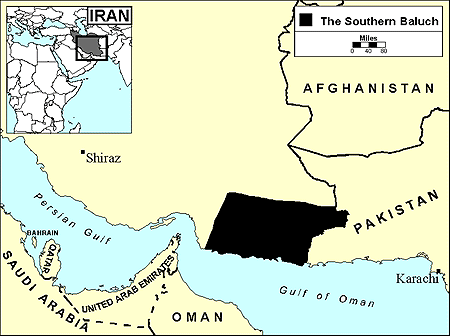|
|
Prayer Profile
The Southern Baluch of Iran
![[IMAGE]](../images1/0206.jpg) The half million Southern Baluch of Iran are part of a much larger Baluch community numbering about eight million. Their homeland straddles the borders of Iran and Pakistan, with a majority living in Pakistan. About half of those in Iran live in cities, while the others are semi-nomadic shepherds. The various Baluch groups speak different languages, each with distinguishing characteristics. These languages have been divided into three groups: Eastern, Western, and Southern Baluchi.
The half million Southern Baluch of Iran are part of a much larger Baluch community numbering about eight million. Their homeland straddles the borders of Iran and Pakistan, with a majority living in Pakistan. About half of those in Iran live in cities, while the others are semi-nomadic shepherds. The various Baluch groups speak different languages, each with distinguishing characteristics. These languages have been divided into three groups: Eastern, Western, and Southern Baluchi.
Their name, "Baluch," is shrouded in controversy. Some say it means "nomad," while others claim that it is an old Persian word meaning "the cock's crest." Their history is just as mysterious. Some have traced their origins to Nimrod, son of Cush (Noah's grandson). But while some things are uncertain, we do know that they first moved to the region in the twelfth century. During the Moghul period, this territory became known as "Baluchistan."
What are their lives like?
Baluchmayar is the honor code by which the Baluch live. These principles include extending hospitality and mercy, dealing with each other honestly, and offering refuge to strangers. They are preserved through both songs and poetry. Children learn proper behavior by watching their elders, and are taunted whenever they misbehave.
The traditional Baluch economy is based on a combination of farming and semi-nomadic shepherding. They usually raise sheep, cattle, or goats. Agriculture is limited because of the harsh climate; nevertheless, it plays a large role in the economy. Their chief crop is wheat. While their survival techniques may vary, each community tries to keep a wide variety of animals and grow many different crops. If the local economy does not provide adequate job opportunities, the young men often move to the cities in search of work.
One wild plant, called the "dwarf palm," is used as a dietary supplement. The meat of the palm is eaten, and the leaves are used to make ropes, shoes, mats, and tents.
Baluch societies are organized into kin-based clans and territorially defined tribes. Male elders are the heads of these tribal units. Village settlements are clusters of mud houses, loosely organized around the home of the local chief. They live in these permanent settlements in the summertime. However, in winter, they migrate to the plains and coastal areas, seeking green grass for their livestock. During this time, they live in tents, and move freely across the landscape as the weather dictates. These temporary settlements are smaller.
The entire household is responsible for tending the family's herd. Women work in groups, threshing and separating the harvest; while plowing and planting are done by the men. Traditionally, land is not privately owned but belongs to the whole tribe.
What are their beliefs?
Prior to the coming of Islam, the Baluch were probably followers of Zoroaster. Today, they are Sunni
Muslims. Their religious practices remain private, and there is no concept of a "state religion." All forms of secular authority are separated from the spiritual authority held by religious leaders.
What are their needs?
The Baluch have been isolated for many years due to Iran's harsh climate, the difficulty of communicating in mountainous terrain, and their reputation as bandits. Since the governments of Iran, Afghanistan, and Pakistan all have a share in Baluchistan's welfare, they have begun building roads and developing agriculture programs. However, the Baluch have remained largely unaffected by these developmental changes.
Very little missions work is taking place among the Southern Baluch. The Jesus film is available; however, only the New Testament has been translated into their language. There are no known believers among them.
Since illiteracy among the Baluch is very high, Christian workers might find open doors into Iran as teachers.
Prayer Points
- Ask the Lord to call those who are willing to go to Iran and share Christ with the Baluch.
- Pray that God will give missions agencies favor and strategies for reaching these Muslims.
- Ask God to open doors for Christian businessmen, teachers, and other tentmakers to share the Gospel with them.
- Pray that God will raise up qualified linguists to complete translation of the Bible into the various Baluchi languages.
- Ask the Holy Spirit to soften the hearts of the Southern Baluch towards Christians so that they will be receptive to the Gospel.
- Pray that God will open the hearts of Iranian governmental leaders to the Gospel.
- Ask the Lord to raise up a strong local church among the Southern Baluch.

Statistics
Latest estimates from the World Evangelization Research Center.
THE PEOPLE
- People name: Southern Baluch
- Country: Iran
- Their language: Baluchi
- Population:
- Largest religion:
- Christians: None
- Church members: None
- Scriptures in their own language: New Testament
- Jesus Film in their own language: Available
- Christian broadcasts in their own language: None
- Mission agencies working among this people: 1
- Persons who have heard the Gospel: 74,400 (14%)
- Persons who have never heard the Gospel: 456,700 (86%)
THEIR COUNTRY
- Country: Iran
- Population:
- Major peoples in size order:
- Major religions:
- Number of denominations: 26
© Copyright 1997
Bethany World Prayer Center
This profile may be copied and distributed without obtaining permission
as long as it is not altered, bound, published
or used for profit purposes.
![[HOME BUTTON]](../graphics/home.jpg)
![[CALENDAR BUTTON]](../graphics/calico.jpg)
![[LIST BUTTON]](../graphics/listico.jpg)
[Home]
[Calendar]
[Country List]
|